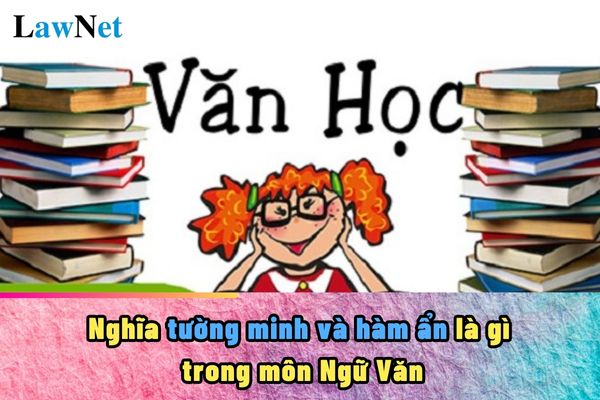In Vietnam, what are explicit meaning and implicit meaning in Literature? When does the first semester of the 2024-2025 school year end?
In Vietnam, what are explicit meaning and implicit meaning in Literature?
- Explicit Meaning: is the direct, understandable meaning when reading a sentence or a line of poetry. It is what the author wishes to convey clearly and recognizably.
- Implicit Meaning: is different; it consists of deeper, hidden meanings behind the explicit surface. To uncover implicit meaning, readers must employ imagination, association, and understanding of life and society for reflection.
* Example applied to the poem "A Small Spring/Mùa xuân nho nhỏ":
- Explicit Meaning:
Describing the beauty of spring: blue-violet flowers, the lark's song, sparkling dewdrops.
The author's love for nature and the country.
A desire to contribute to life.
- Implicit Meaning:
A Small Spring: Not only the spring of nature but also a symbol for the small contributions of each individual to the collective life.
Blue-violet flowers, the lark's song: Are metaphors for beautiful, noble things in life.
The soldier and the farmer: Represent hardworking people who are building the country.
*Note: Information about explicit meaning and implicit meaning in Literature is only for reference./.

In Vietnam, what are explicit meaning and implicit meaning in Literature? When does the first semester of the 2024-2025 school year end? (Image from the Internet)
In Vietnam, what is the grade at which the Literature program includes explicit meaning and implicit meaning?
Under Section 3 Appendix of the General Education Program for Literature promulgated along with Circular 32/2018/TT-BGDDT, the outcomes required for the 8th-grade Literature program are as follows:
KNOWLEDGE OF VIETNAMESE LANGUAGE
- Meaning of some relatively common idioms and proverbs.
- Nuances of word meanings and word choice.
- Visual and onomatopoeic words: features and effects.
- Meaning of some common Sino-Vietnamese elements (e.g., vo, huu) and the meaning of words containing those elements (e.g., vo tu, vo hinh, huu quan, huu han).
- Particles, interjections: features and functions.
- Non-essential components in sentences: features and functions.
- Declarative, interrogative, imperative, and exclamatory sentences; affirmative and negative sentences: features and functions.
- Rhetorical devices of inversion, rhetorical questions: features and effects.
- Explicit and implicit meanings of sentences.
- Types of deductive, inductive, parallel, and combined paragraphs: features and functions.
- Types of documents and genres.
- Narrative texts: an essay recounting a trip or a social activity.
- Expressive texts: six-syllable, seven-syllable poems; paragraphs reflecting on a six or seven-syllable poem.
- Argumentative texts: thesis, points, reasoning, and evidence; a discussion on a life issue; an analysis of a literary work.
- Informative texts: objective information, subjective opinions, and the purpose of the text; explanatory text to describe a natural phenomenon; book introduction; proposal document.
- Nationwide language and regional dialects: function and value.
- Social jargon: function and value.
- Non-verbal communication tools: images, data, graphs,...
* LITERATURE KNOWLEDGE
- Imagination in literary works.
- Title and methods of titling texts.
- Subject and theme, ways of identifying the theme; structure.
- Plot, setting, characters, and language in humorous, historical stories.
- Single-threaded and multi-threaded plots.
- Main artistic techniques of satirical poetry.
- Some poetic regulations of seven-word octaves and quatrains following Tang law: composition, rhyme, law, rhythm, contrast.
- Some formal elements of a poem: words, images, composition, emotional flow.
- Conflict, action, character, dialogue, and satirical techniques in literary scripts (comedy).
- Some formal elements of free verse (six, seven syllables): number of lines, words, rhyme, rhythm.
- The reader and individual reception of a literary text.
- Reflected content and the author's perspective on life and people.
Thus, it can be seen that explicit and implicit meanings are part of the Grade 8 Literature curriculum.
In Vietnam, when does the first semester of the 2024-2025 school year end?
According to Decision 2045/QD-BGDDT stipulates the upcoming 2024-2025 school year as follows:
- The earliest enrollment is one week before the school year opening ceremony. For Grade 1, the earliest enrollment is two weeks before the opening ceremony.
- The opening ceremony for all levels will be held on September 5, 2024.
- The first semester ends before January 18, 2025, the program is completed and the school year ends before May 31, 2025.
- Completion of primary school and graduation recognition for junior high school before June 30, 2025.
- Completion of enrollment for the first grade levels before July 31, 2025.
- The high school graduation exam of 2025 is tentatively held on June 26 and 27, 2025.
- Other national exams will be organized according to regulations and guidance from the Ministry of Education and Training.
*Note: To know the exact first day of school for the 2024-2025 school year, parents and students should follow announcements from the school or local authorities.
Thus, according to the above regulations, the education program is completed and the first semester ends before January 18, 2025.

